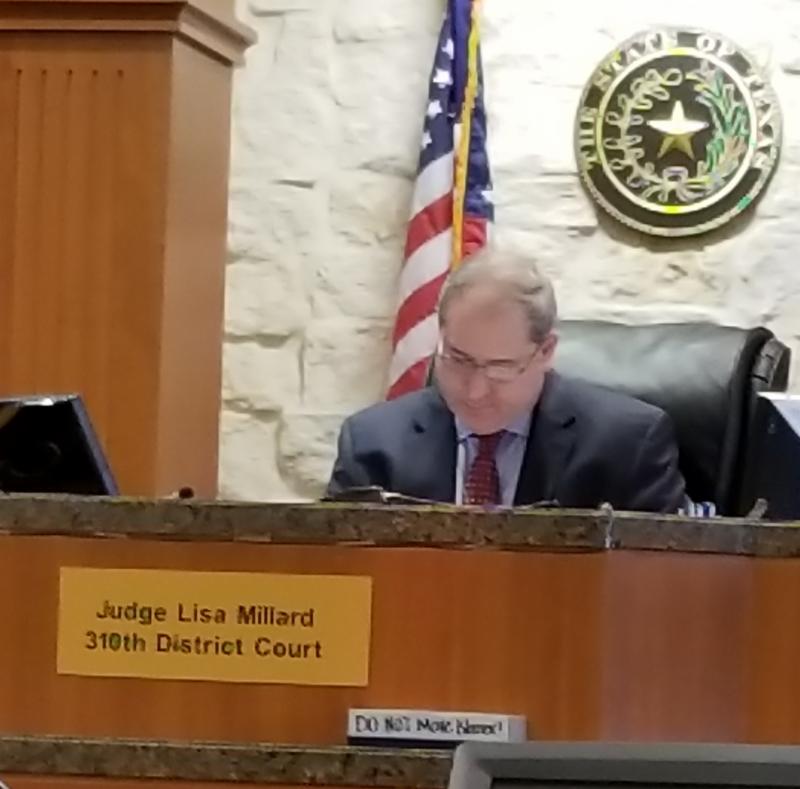|
|
Issue: No. 80 March 5, 2018
|
|
In this issue .... PLEASE DISPLAY IMAGES ON THIS EMAIL
Finally... Food!
The Harris County Civil Courthouse has been without a cafeteria for over six months. This past Wednesday, that sad situation changed with the opening of a Luby's/Fudruckers and a Starbucks in the basement.

The Starbucks is not a full service operation and its employees do not make the esoteric coffee drinks, but it is open from 6:30 a.m. until 5:30 p.m.

Judge Dean Knows How to Conduct a Jury Trial
Judge Sheri Y. Dean and I have not always seen eye-to-eye on her legal rulings in some cases. But, after my trial with her weeks ago, I can certify that the woman really knows how to conduct a jury trial. Judge Dean may waste time at docket call chatting with lawyers before they start discussing their cases, but she runs jury trials with efficiency and she starts early and on time. Thanks to my days as a personal injury attorney, I have been involved in over 100 jury trials, so I can tell when a judge does not know what he or she is doing in a trial by jury. Judge Dean is friendly with the jury, firm with the lawyers and she knows the procedures. For example, she required the lawyers to provide an explanation even when we both agreed that a prospective juror should be struck for cause. She pointed out errors in our jury charge and then was willing to reword the Pattern Jury Charge question on the geographic restriction based on the testimony in our case. She immediately conducted the property portion of the divorce trial as soon as the jury went out to deliberate. Judge Dean was strictly neutral with the lawyers and she made no comments that could have made the jury suspect who she was for.
I often write to criticize judges, so it is only fair to share praise just as often. Judge Dean's staff, from the bailiff to the court reporter to the clerk, was just as efficient and highly skilled in how they handled the jurors and the lawyers. They were very friendly with the nervous parties and Delores Johnson definitely helped out the lawyers with the audiovisual equipment.
I am still in my second jury trial in two weeks (fifth trial in four weeks), which explains my delay in getting another issue of this newsletter out to you.
The Mongoose Effect
Click here to read the last issue of this newsletter which suggested Galveston County District Judge Lonnie Cox should be investigated for possible ethical and even criminal issues because Cox's lawyer in a civil case was allowed to practice in Cox's court, was appointed by Cox on criminal cases, his criminal fees were approved by Cox and then that lawyer gave the judge legal services for free or at a greatly reduced rate. My story was the top headline in the Galveston Daily News the next day.

The next day, another front page article in the newspaper quoted a legal ethics expert, who agreed with me:
Accepting reduced or free legal services from an attorney could be construed as a gift and give an appearance of impropriety, especially if the attorney providing those services continued to have cases in the judge's court, said James Alfini, a law professor and dean emeritus at South Texas College of Law who specializes in judicial ethics. "This situation has all sorts of ethical issues," Alfini said, prefacing that he couldn't speak to any criminal violations. "It seems to me there's enough here it would trigger an investigation pretty quickly."
A third article in the Galveston Daily News provided more details of my complaint and essentially said that Cox has mislead the newspaper about how he paid his lawyer (my article revealed he used campaign funds to pay his attorney). The News wrote:
In interviews with The Daily News, Cox had not disclosed he was paying for the legal fees from his campaign fund and in a guest column Cox wrote and which appeared in the Jan. 18 edition of the newspaper, he said: "I paid the entire bill from my bank account."
A lengthy editorial in the
Galveston Daily News
also discussed my allegations and questioned the timing of my article.
Click here
to read this editorial. I would explain to the editor of the News, whose reporters never do independent, in-depth investigative journalism that questions elected officials, that I published my article as soon as I discovered that Judge Cox had been appointing his own civil lawyer in criminal cases and only after I had spent a few weeks investigating and confirming facts.
District Attorney Jack Roady is properly recusing himself from investigating Cox and he has turned the matter over to the division of the Texas Attorney General's office which assists DA's in similar situations. The Attorney General is not taking any action before the March 6 primary and will not confirm or deny it is investigating Cox. Two sources confirm the AG has the case. It makes sense that the state prosecutors will start work after the primary election tomorrow where Judge Cox is running against County Judge Mark Henry. Of course, an investigation does not mean any crime was committed. Judge Cox hotly denies he did anything wrong, although his many e-mails about me fail to really respond to the 100% provable facts I outlined in my article. Click here to read one of several e-mails Cox sent out about my investigation. My newsletter story and my name are being mentioned a lot in advertisements and mass e-mails in this very nasty Republican contest. My investigation even plays a role in the political sign wars.

Book Reviews
Directorate S

Sherlock Holmes' lodge-mate, Dr. John Watson, an injured veteran of the Battle of Marawand, knew in 1881 that the world's most powerful military could regret invading Afghanistan. In fact, Britain invaded Afghanistan twice and each time experienced disaster and ultimate retreat. The Russians learned that lesson in the 1980's and now it is the turn of the United States. Our nation has spent over a trillion dollars on the longest war in its history and there is no end in sight to the conflict in Afghanistan. In fact, it appears that we are currently losing that war as the Taliban gains territory and wreaks havoc in the cities controlled by the corrupt government we support.
Steve Coll is the dean of
Columbia's Graduate School of Journalism and he has won two Pulitzer Prizes. His second was for his 2004 book,
"Ghost Wars," a history of conflict in Afghanistan from the 1979 Soviet invasion to the eve of 9/11. "Directorate S" continues that story from 2001 through 2016. The title, "Directorate S" refers to the arm of Pakistani intelligence that focuses on Afghanistan. One of the many mistakes made by the American military when it invaded Afghanistan, was to totally misread Pakistan's influence with, and plans for, the Taliban. Pakistan acted as if it was cooperating with the U.S. but it never stopped helping the Taliban. While Washington paid subsidies to Pakistan amounting to hundreds of millions of dollars, the Pakistanis were still actively supporting the Taliban. Pakistan's military leaders were playing a double game, the U.S. military knew they were and yet could do nothing about it. Coll explains why Pakistan feels Afghanistan and the Taliban are so vital to its strategy to contain their foe India and to disrupt Kashmir. The wonder is that our military leaders were not able to figure out what Coll does such a great job of explaining in his book.
Click here to buy the book from Amazon, which describes the book as follows:
Today we know that the war in Afghanistan would falter badly because of military hubris at the highest levels of the Pentagon, the drain on resources and provocation in the Muslim world caused by the U.S.-led invasion of Iraq, and corruption. But more than anything, as Coll makes painfully clear, the war in Afghanistan was doomed because of the failure of the United States to apprehend the motivations and intentions of I.S.I.'s "Directorate S". This was a swirling and shadowy struggle of historic proportions, which endured over a decade and across both the Bush and Obama administrations, involving multiple secret intelligence agencies, a litany of incongruous strategies and tactics, and dozens of players, including some of the most prominent military and political figures. A sprawling American tragedy, the war was an open clash of arms but also a covert melee of ideas, secrets, and subterranean violence.
Coll excavates this grand battle, which took place away from the gaze of the American public. With unsurpassed expertise, original research, and attention to detail, he brings to life a narrative at once vast and intricate, local and global, propulsive and painstaking.
This is the definitive explanation of how America came to be so badly ensnared in an elaborate, factional, and seemingly interminable conflict in South Asia. Nothing less than a forensic examination of the personal and political forces that shape world history, Directorate S is a complete masterpiece of both investigative and narrative journalism.
I do not expect to win every case. I just want an efficient system in which my client gets a fair hearing before a judge who works hard, knows the law, and does not play favorites. I also expect judges to appoint qualified amicus attorneys who zealously look after children (and who actually personally visit their minor clients in their homes). Is that asking too much? Stay tuned.
Greg Enos
The Enos Law Firm
|

The Enos Law Firm
17207 Feather Craft Lane, Webster, Texas 77598
(281) 333-3030 Fax: (281) 488-7775
Please forward this e-mail newsletter to everyone who cares about our family courts!
Click here for an archive of past issues of
The Mongoose.
|
 Judge Lisa Millard Should Resign
|
A woman who has litigated for years in the 310th District Court and gone to court over and over, sat in that court a few weeks ago with her lawyer waiting for their case to be called. The judge was on the bench, so the woman whispered to her lawyer, "What the hell was wrong with that poor judge's mother?" "What do you mean?," asked the confused lawyer. The woman replied in all sincerity,"What mother would ever name her son 'Lisa'?" The woman was looking at Associate Judge Conrad Moren sitting up on the bench in the 310th as he almost always does over the metal name plate that says,"Judge Lisa Millard." In all her years appearing in the 310th, that woman had never seen Judge Millard actually working in her own court. She really thought that HE was Lisa Millard.

The sad fact is that Judge Millard is seldom at work in her courtroom. Harris County family attorneys all know and frequently complain about this situation, but no one is willing to stand up and say anything about it. Most of us attorneys genuinely like Judge Millard and consider her a really good judge when she is at work. We all have sympathy for her battles with cancer and the complications of her cancer treatments. But at some point, an elected public servant must think of the better good of the public and not her own situation. It is time for Judge Millard to step down after a great career as a jurist and allow a full-time judge to take her place. Millard can enjoy her excellent retirement after 22 years as a judge and still be covered by health insurance.
 Judge Lisa Millard Judge Lisa Millard
Associate Judge Conrad Moren does an amazing job, largely running the court by himself. But, the litigants, witnesses and lawyers deserve more. We need two full-time, hard working judges in the 310th moving cases and dispensing justice.
I spent the last week in yet another jury trial in the 507th District Court. Each day I would step across the hall to peak inside the 310th and I never saw Judge Millard. It was always Judge Moren on the bench. While I did hear someone mention that Judge Millard had been seen briefly on Tuesday morning, it looked like a typical week in that court that we all have come to expect - no elected judge and an over-worked associate judge.
I had one divorce client who got screwed in arbitration and she was in arbitration only because her enforcement hearings and trials kept getting reset because Judge Millard was not present and the wiley opposing counsel objected to the AJ hearing the case. Almost every day outside the 310th, I hear lawyers joking and speculating about whether Judge Millard will be in court. Sadly, most always assume she will not be there and they are usually right. Lawyers I know have seen Judge Millard about town during week day working hours while a few miles away, the 310th courtroom was almost certainly full of nervous parents and expensive attorneys waiting for their cases to be heard.
Someone has to finally say what everyone is thinking - Judge Millard should step down if she cannot or will not work full-time. At this point, after years of prolonged absences from the bench, it does not matter if it is illness or boredom that is causing Judge Millard to so seldom be at work. She is a public servant paid a large salary to work full-time to do very important and demanding work. Millard owes it to tax payers and the families whose lives depend on her court's rulings to step down if she cannot start working all day every day like she did so well when she was first elected.
I hope Judge Millard is currently healthy and I will feel real bad if I learn she was home last week very sick. I like Judge Millard and consider her a smart, fair judge when she is actually at work. However, these prolonged absences have been going on for years. I was very disappointed to hear that she filed for reelection this year. I guess she assumed that she could glide through another election without anyone pointing out that she is usually not at work. If Judge Millard retires and steps down, she could still enjoy a career as a visiting judge and not worry about losing the general election this November, which would allow lawyers to freely object to her,
The sycophants who make a living off of sucking up to judges will surely attack me for this article, but we all know that the 310th needs a full-time judge and years of prolonged, frequent absences by Judge Millard are just not fair to the families stuck in divorces or custody cases.
I ask lawyers to email me each day starting today to let me know of any Judge Millard sightings in her court and I will keep a running tally of the days that it appears she is present or absent.
|
 Meet the Democrats: Tristan Longino
|
Roy Moore is about as good as a judge can be in my opinion, but, he may be out of office in ten months if the Democrats sweep Harris County in the election this November (see story below). Attorney Tristan Longino is running unopposed for the Democratic nomination to oppose Moore to be judge of the 245th Family District Court.
Longino has been a lawyer for six years. He is board certified in Family Law as of last year. He currently works for Matt Skillern and in the past he worked for John Nichols Sr. and Chris Spofford. He graduated from the University of Houston Law Center in May 2011. His undergraduate degree was from the University of Richmond in business and he worked as a broker for Merrill Lynch for several years. Longino is married and has two children.
I urge you to look at Longino's campaign web site, as he has some pretty interesting ideas for running a court, including the very good suggestion to do away with docket calls and use that time to hear cases. Click here to see Longino's web site.
Lawyers should not just assume that a young attorney with limited experience will be a bad judge. Many thought that about John Schmude and he has turned out to be a great judge. We do know that Longino, if he is elected, will not be Roy Moore. At a minimum, things will be different and it will take us all a while to figure any new judges out and feel comfortable predicting how they will rule (which is a huge part of what lawyers do for their clients).
Logino reported in his January 2018 campaign finance report that he had received $1,055.34 in contributions, spent $499.64 from those contributions and also spent $2,529.58 by credit card and $5,609.58 of his own personal funds. In contrast, Roy Moore reported contributions of $22,350 and expenditures of $16,938.77. Moore had a massive $206,318.57 cash on hand.
I have known Longino for a while and he seems to be a very intelligent, friendly guy. I urge you to take the time to get to know him and his fellow Democratic judicial candidates because 2018 looks to be a a year when an anti-Trump, Democratic wave hits even in Harris County.
|

Will A Democratic Tsunami Hit Harris County?
|
I do not want to lose some of our really good incumbent judges in Harris County, but I truly think this may well be a Democratic sweep year. Here are a few reasons why:
2018 Will Be The Last Election With Straight Ticket Voting for Judges
The Texas Legislature changed the law and starting in 2020, voters in general elections cannot use straight ticket voting for judges. 2018 will be the last election that allows straight ticket voting for judges. A year ago, the legislature assumed that would help Republicans one last time in a non-presidential election year. Now, many think it will help Democratic judicial candidates in Harris County where Trump lost by 160,000 votes in 2016 (and he is even more unpopular now).
Democratic Turn Out in Early Voting Is Way Up
In the last mid-term election in 2014, 45,292 more people voted in the Republican primary than voted in the Democratic primary in early voting in Harris County. This year, the Democrats had 6,559 more voters participate in early voting. Put another way, the increases from 2014 to the 2018 primaries were as follows:
In Person Voting: Republican turnout increased 6% from 2014 and Democratic turnout increased 308%.
Mail In voting: Republican turnout increased 13.9% from 2014 and Democratic turnout increased 241%.
Total early primary voting: Republican turnout increased 8.14% from 2014 and Democratic turnout increased 292%.
That is an extraordinary increase and strong evidence of how enthusiastic Democratic voters are this year. This is from the
Off the Kuff blog on the total number of voters in each primary for this year and the last two mid-term elections:

The number of voters in the primary is an indication of the level of excitement and dedication each party will bring into the general election in November. This year's extraordinary primary turn out is a very bad sign for Republicans.
The President's Party Gets Pummeled in His First Mid-Term Election
Political scientists study congressional races and not local judicial races. However, it is reasonable to assume that if one political party gets pummeled in congressional races, its local judicial candidates will have a much harder time with re-election.
A CNBC article of August 8, 2017 explained:
In the 18 midterm elections since World War II, the president's party has lost an average of 25 House seats and 4 Senate seats. Then narrow that group to the midterm elections in which the president's party controls both houses of Congress, and therefore can't easily deflect responsibility for problems onto the opposition. In those nine mid-term elections, the president's party has lost an average of 33 House seats and 4.7 Senate seats.
In an overlapping group of nine mid-term contests, the president's approval rating in the Gallup Poll was below 50 percent immediately before Election Day. In those elections, his party did even worse, losing an average of 36 House seats and 5.8 Senate seats.
Seven modern midterm contests have combined both factors: unified control of both ends of Pennsylvania Avenue and presidential approval below 50 percent. And they paint an even more ominous picture for today's Republican majority in Congress. In those seven midterms, the president's party lost an average of 41 House seats and 6.4 Senate seats. In four cases, control of the House flipped; in three of them, control of the Senate flipped, too. In ten months, we will face that latter situation: a very unpopular President of the party that controls both houses of Congress.
Historically, Republicans Have a Slight Edge in Mid-Term Elections (Unless the President is a Republican)
From the excellent 538 web site (fivethirtyeight.com):
Overall, in the 10 midterm elections since 1978, the average Republican turnout advantage has been about 3 percentage points. In other words, the GOP does about 3 points better, on average, among midterm voters compared with whatever their margin is vs. Democrats among all registered voters. In short, Republicans have a midterm turnout advantage.
There's a second important force at work during midterm elections, however. The Republican turnout advantage is either exacerbated or all but canceled out depending on which party controls the White House. Scholars have long shown a major loss of support for the president's party in midterm elections. With a Democrat in the White House, the GOP turnout advantage gets even bigger. With a Republican in the Oval Office, the GOP on average barely has any advantage at all.
Click here to read the entire article.
A Swing of Five Percent Would Elect Democratic Judges in Harris County
For example, in 2014, Sheri Dean got 54.54% of the general election vote and Kathy Vossler got 45.46%. A swing of 5% would have elected Vossler and every single Democrat running for judge in Harris County.
Democrats Are Kicking Ass Across the County in Special Elections
This is what Electoral-Vote.com just wrote:
Across 70 special elections in 2017, Democrats ran 10 points ahead of Hillary Clinton and 7 points ahead of Barack Obama's 2012 results. In the 12 races in 2018 so far, the numbers have gotten even better for the blue team, with their candidates running 23 points ahead of Clinton and 8 points ahead of Obama. It's not very likely that the Democrats can maintain that kind of average swing during the midterms, especially since many incumbents will be running. However, a swing of 5 points is very plausible (and may even be conservative)... [Remember: a swing of five percent in Harris County elects Democrats to all of the local benches].
There does seem to be a correlation between how a party does in special elections and how it does the next year in congressional elections. Click here for a nerdy article with charts and regression analysis.
Four examples from the superb electoral-vote.com website (where I go first every morning):
February 22 - Forty five point swing in Kentucky. Yet another Democrat has won a special election in a state House district that Donald Trump won by a huge margin. In this case it is KY-49, a district Trump won in 2016 by a margin of 72% to 23% over Hillary Clinton. In Tuesday's special election, Democrat Linda Belcher beat Republican Rebecca Johnson by a margin of 68% to 32%. Going from 23% to 68% is a gain of 45 points for the Democrats
February 13 - Twelve percent swing in Florida. Democrat Margaret Good who was running an anti-Trump campaign, won the state senate seat for Republican-leaning Florida District 72 by 7.4 percent. Trump carried the district by 4.6 percent, so that was a swing of 12 percent. Democrats at both the state and national levels are taking particular notice of Tuesday's win. The area covered by Florida 72 (Sarasota) has 10% more Republicans than Democrats, and was carried by Donald Trump by 4.6 percentage points. The Republican candidate was the son of the area's well known congressman. Further, the last two times that the seat was flipped by a Democrat-1992 and 2006-ended up being Democratic wave elections. Hence the reason that a fairly small local election is being described as a "bellwether."
February 8 - Thirty one point swing in Missouri - Democrat Mike Revis won a Missouri state house seat in a district that Trump won by 28 points. Since he won by 3 points, that's a 31-point swing. The GOP managed to prevail in the three other elections held in Missouri this year, but that's the end of the good news for them, as the point swings in those districts, relative to Trump-Clinton, were 18 points, 25 points, and a staggering 59 points, all in the direction of the Democrats. That's an average swing, across the four races, of 33.25 points. Since Trump's inauguration, Democrats have flipped 35 contested seats in state legislatures while Republicans have flipped between one and three, depending on your standards (one definite flip in Massachusetts, one uncontested flip in Louisiana, and one flip of an officially nonpartisan seat in Mississippi).
January 18 - Twenty seven point swing in Wisconsin - Democrat Patty Schachtner defeated state representative Adam Jarchow (Republican) in a special election for a vacant state senate seat in rural Wisconsin Tuesday. The district, which borders Minnesota in the northeastern corner of the state, has been in Republican hands for decades. Donald Trump won the district by a resounding 17 points in 2016. Now, an unknown Democrat whose only experience in public office is being a member of a local school board, has knocked off a state representative in a deeply-red rural district by 11 points. Unlike the Alabama special election, where the Republicans ran a badly flawed candidate, Jarchow was a respected member of the state's lower house and he ran a good, well-funded campaign, but the energy on the Democratic side was enormous.
Harris County Demographics Trend Democratic
In 2016, Hillary Clinton beat Donald Trump in Harris County by more than 160,000 votes. In 2012, Obama won Harris County by just 971 votes. Voters with Hispanic surnames increased by 34% in Harris County in the 2016 general election compared to 2012. Each year, the percentage of the voting age population in Harris County that is white shrinks and there are fewer older voters (who tend to support the GOP).
People Are Much More Likely to Vote If They Are Mad
This November, anger against Trump will motivate people to vote even if he is not on the ballot. Political scientists have proven that we are far more likely to turn out if we cannot stand someone. That's one of the conclusions of an ambitious study of voter attitudes spanning a 24-year period led by Jon A. Krosnick, professor of psychology and political science at Ohio State University. The study, involving researchers from Princeton and Northwestern universities and the University of Chicago, builds upon data collected in face-to-face interviews with thousands of Americans over the course of many elections by the National Election Study. The ongoing study, which began at the University of Michigan in 1952, has been funded for the last 30 years by the National Science Foundation. Source: ABC News
|
 The 507th is Rejecting Standard TRO's Straight Out of the Form Book The 507th is Rejecting Standard TRO's Straight Out of the Form Book
|
The defense of "this how is everyone does it" or "this is how it has always been done" should not work if what is being done is just wrong.
The judges in the 507th District Court in Harris County are rejecting standard temporary restraining orders (TRO's) even if they match verbatim with the State Bar form in the Texas Family Law Practice Manual.
It appears that Judges Maldonado and Evans may well be correct in rejecting TRO's using the standard form language.
The Family Code says:
Sec. 6.501. TEMPORARY RESTRAINING ORDER. (a) After the filing of a suit for dissolution of a marriage, on the motion of a party or on the court's own motion, the court may grant a temporary restraining order without notice to the adverse party for the preservation of the property and for the protection of the parties as necessary, including an order prohibiting one or both parties from:
(1)
intentionally communicating in person or in any other manner, including by telephone or another electronic voice transmission, video chat, in writing, or electronic messaging, with the other party by use of vulgar, profane, obscene, or indecent language or in a coarse or offensive manner,
with intent to annoy or alarm the other party;
The TRO form in the Texas Family Law Practice Manual (and thus Pro Doc) says that the parties are enjoined from:
1. Communicating with the other party in person or in any other manner, including by telephone or another electronic voice transmission, video chat, in writing, or electronic messaging, by use of vulgar, profane, obscene, or indecent language or in a coarse or offensive manner.
The TRO leaves out "intentionally" and "with intent to annoy or alarm the other party." Associate Judge Evans told me that TRO's are being denied if they omit this "mens rea" language from the statute. Mens rea is a Latin phrase and refers to the defendant's state of mind and intent to commit the act. It was traditionally included in this Latin description of criminal liability -- "actus reus non facit reum nisi mens sit rea," meaning,"the act is not culpable unless the mind is guilty." The 507th takes the position that they can only issue a TRO in a divorce case if it complies exactly with what Sec., 6.501 authorizes, otherwise they do not have the power to grant the TRO unless it is supported by an affidavit.
These are all the provisions in Sec. 6.501 that have a "mens rea" component which is not included in the standard TRO language:
(1)
intentionally communicating in person or in any other manner, including by telephone or another electronic voice transmission, video chat, in writing, or electronic messaging, with the other party by use of vulgar, profane, obscene, or indecent language or in a coarse or offensive manner,
with intent to annoy or alarm the other party;
(2) threatening the other party in person or in any other manner, including by telephone or another electronic voice transmission, video chat, in writing, or electronic messaging, to take unlawful action against any person,
intending by this action to annoy or alarm the other party;
(3) placing a telephone call, anonymously, at an unreasonable hour, in an offensive and repetitious manner, or without a legitimate purpose of communication
with the intent to annoy or alarm the other party;
(4)
intentionally, knowingly, or recklessly causing bodily injury to the other party or to a child of either party;
....
(6)
intentionally, knowingly, or recklessly destroying, removing, concealing, encumbering, transferring, or otherwise harming or reducing the value of the property of the parties or either party with intent to obstruct the authority of the court to order a division of the estate of the parties in a manner that the court deems just and right, having due regard for the rights of each party and any children of the marriage;
(7)
intentionally falsifying a writing or record, including an electronic record, relating to the property of either party;
(8)
intentionally misrepresenting or refusing to disclose to the other party or to the court, on proper request, the existence, amount, or location of any tangible or intellectual property of the parties or either party, including electronically stored or recorded information;
(9)
intentionally or knowingly damaging or destroying the tangible or intellectual property of the parties or either party, including electronically stored or recorded information;
(10)
intentionally or knowingly tampering with the tangible or intellectual property of the parties or either party, including electronically stored or recorded information, and causing pecuniary loss or substantial inconvenience to the other party;
I guess we all need to modify our TRO forms to match the statute. I fear some divorce parties will see the word "intentionally" in a TRO and then cleverly decide they can get away with "accidentally" doing something the TRO forbids.
|
Attorney Greg Enos has been through his own divorce and
child custody battle (he won) and understands
what his clients are going through. Enos
graduated from the University of Texas Law
School and was a successful personal injury
attorney in Texas City be
fore he decided his true
calling was to help families in divorce and child
custody cases. Greg Enos is active in politics and in Clear Lake area charities. He has served as President of the Bay Area Bar Association and President of the Board of
Interfaith Caring Ministries. The Enos Law Firm serves clients in Galveston County, Brazoria County and Harris County, Texas.
Greg Enos
Board Certified in Family Law, Texas Board of Legal Specialization
The Enos Law Firm
281-333-3030
www.divorcereality.com
|
|
|
|
Copyright © 2015. All Rights Reserved.
|
|
|
 |
 |
|
|